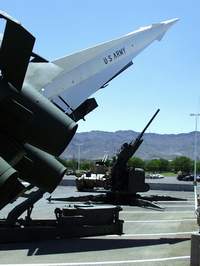USA aims to trap Russia with anti-missile systems deployed in Czech Republic and Poland
U.S. plans to deploy a radar network of the global U.S. missile defense system in the Czech Republic and Poland have caused the tensions between Russia and United States spring up. Russia’s Defense Minister Sergei Ivanov threatened that Russia would take “adequate steps” in response, while Russian Foreign Minister Sergei Lavrov called the plans “a change in the military presence” in Europe. Meanwhile, Russia and Belarus is still in disagreement on a regional antiaircraft system as Belarus extends a “hand of friendship” to the West.

The U.S. plans to deploy missile defense assets in Europe to intercept “missiles that could be launched by political regimes linked to terrorists.” According to plans, U.S. missile interceptors would be deployed in Poland, and the Czech Republic would host early-warning radars in Lybava, a military range in northeastern part of the Czech Republic.
The U.S. plans for the deployment of anti-missile defense systems in Central Europe have given rise to a lot of controversy. The U.S. has long advocated such a move though both the populations and a part of the establishment of Central European countries are not overly enthusiastic about this kind of initiatives.
Meanwhile, Russia sees the U.S. plans as a direct threat to its national security. “We’re opposed to the plans for the development of a third anti-missile shield of the U.S. missile defense system in Europe because we simply see no political reasons, let alone the military ones, for going ahead with the plans,” said Russia Defense Minister Sergei Ivanov on January 20. According to him, the deployment of U.S. anti-missile defense system in Eastern Europe will have no impact whatsoever on Russian security. “Russia’s new ground-based Topol-M missile complexes can reliably overcome any missile defense systems,” said Ivanov, who is also deputy prime minister. Ivanov sounded even harsher while speaking on the subject several days later in Delhi. He dismissed the argument that the American defenses were designed to protect Europe from Iranian and North Korean missile strikes. “Neither North Korea nor Iran has intercontinental-range ballistic missiles which could pose a threat to the U.S. and its allies,” Ivanov was quoted as saying. “The question is: Whose missiles is this defense system going to intercept?” asked Ivanov. He also admitted that Washington had already made the decision on the matter, and the current talks with the Czech Republic and Poland were a mere formality.
Russian Foreign Minister also made a statement on the U.S. initiative. Foreign Ministry spokesman Mikhail Kamynin said January 26 that Moscow saw the step as an attempt to inject a strategic character into the U.S. military presence in Europe. “We cannot but notice the consecutive process of adding a strategic component to U.S. armed forces stationed in Europe,” said Kamynin. “The deployment of U.S. missile defense assets in Europe can only be interpreted as a significant reconfiguration of U.S. military presence in the region,” added Kamynin.
Tensions between Russia and United States are on the increase as the relations between Russia and Belarus continue to sour. The latest economic standoff aside, the Kremlin was always confident that Belarus was Russia’s true ally when it comes to military and political cooperation. The agreement on the development of a joint Russian-Belarusian regional antiaircraft systemwas approved by allRussianministries and agencies. However, the document is still to be signed by the presidents of two countries. Russia sees the regional antiaircraft system as an adequate response to NATO enlargement. “Let NATO planes use the airfields wherever they want. That’s the reason why we’re developing a regional antiaircraft system,” Army General Vladimir Mikhailov, commander of Russia’s Air Force, was quoted as saying several months ago while answering the question about possible deployment of NATO aircraft in Poland.
Gen. Mikhailov said January 18 that the signing of the agreement on the development of Unified Regional Antiaircraft System would take place before the end of January. However, Mikhailov’s statement soon became obsolete following a report by Interfax that cited a source with Belarus’ Defense Ministry. The source told Interfax that the documents were still being agreed upon, and nobody knew how long the process would take to complete. Belarus is apparently dragging out the signing of the agreement, while President Lukashenko launched an active anti-Russian campaign in the Belarusian media. The Belarusian president has not ruled out the possibility for Belarus to switch into euro one day, Die Welt reports. According to Lukashenko, Belarus is located in the center of Europe, and shares European values. Belarus is keen to cooperate with Europe, its second largest partner (Russia being the first one) in terms of trade and economic relations. Lukashenko said that Belarus was extremely interested in attracting European and U.S. investments in the Belarus economy following the latest energy conflict between Belarus and Russia. Russia would not have taken such a tough stand on the issue had the Western energy companies held stakes in the Belarusian energy transit systems, according to Lukashenko.
Lukashenko made his statement amid the ongoing turmoil in the relations between the two countries. The crisis has reached its latent stage as the problems relating to Belarusian sugar exports to Russia and Russian oil supplies to Belarus remain unsolved. Besides, Lukashenko cannot forgive Russia for introducing new export tariffs for its oil exports and gradual transition to market prices for natural gas supplies.
The deployment of anti-missile defense systems in Central Europe could become yet another factor of tension in the relations between Russia and U.S. It could also raise stakes in the struggle for geopolitical influence in the republics of the former Soviet Union, Belarus inclusive. As regards Lukashenko, he has always appealed to the West once his relations with Moscow began to deteriorate. The West seems to be perfectly aware of the motives behind his maneuvering. Moscow got used to this kind of behavior too though it is highly unlikely that the Kremlin will appreciate the fact that Lukashenko is actually putting under threat one of the “sacred cows” of the bilateral relations i.e. the agreement on the development of a regional antiaircraft system, especially in view of U.S. intentions to implement its military and political plans in Central Europe. All the above fuel contradiction between the Kremlin’s two priorities e.g. taking a different course in energy relations and the interests pertaining to national defense. As a result, Russia could put more pressure on Belarus and thus hike the stakes in the struggle for influence on Belarus’ policy.
Politcom
Translated by Guerman Grachev
Pravda.ru
Subscribe to Pravda.Ru Telegram channel, Facebook, RSS!





